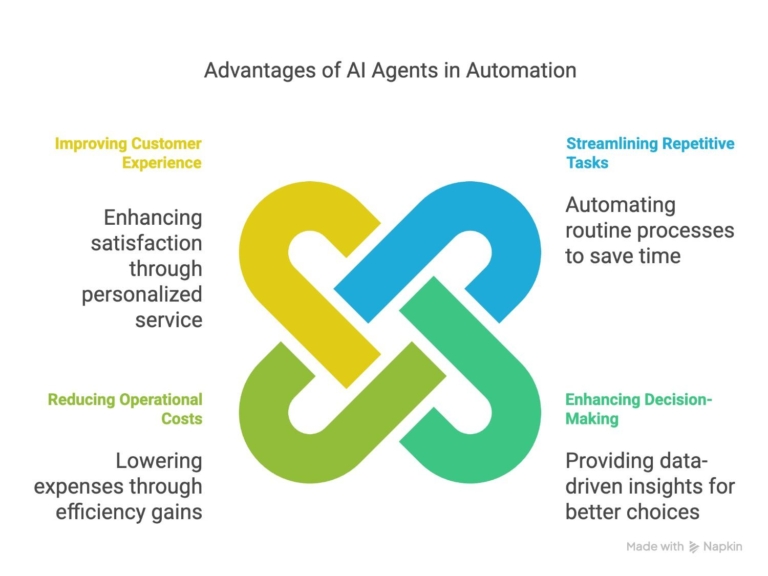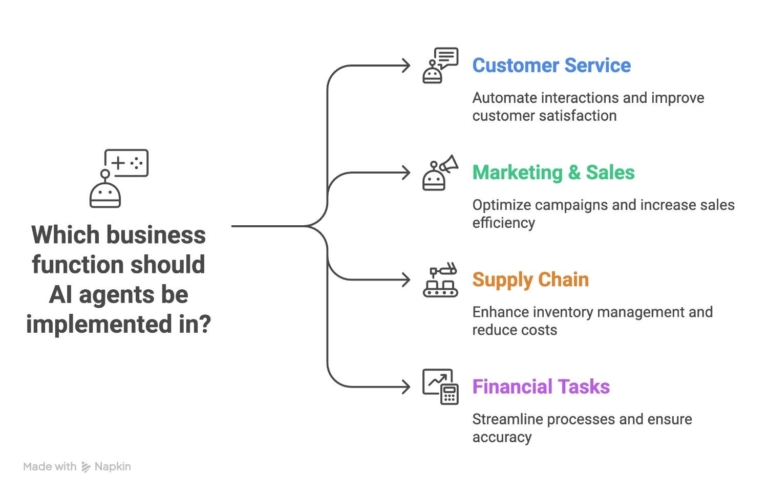Greetings! I'm Aneesh Sreedharan, CEO of 2Hats Logic Solutions. At 2Hats Logic Solutions, we are dedicated to providing technical expertise and resolving your concerns in the world of technology. Our blog page serves as a resource where we share insights and experiences, offering valuable perspectives on your queries.

Quick Summary
AI agents for business automation are upgrade the way businesses operate by handling repetitive tasks, improving decision-making, and enhancing customer experiences. From customer service and marketing to finance and supply chain, AI agents integrate with existing systems to create smarter, more efficient workflows. With expert guidance, companies can adopt AI agents to streamline operations and bring new growth opportunities.
E-commerce companies are constantly seeking ways to streamline operations, reduce costs, and enhance productivity. This is where AI agents for automation come into play. Unlike traditional automation tools that follow rigid rules, AI agents can learn, adapt, and make decisions based on data, enabling businesses to automate complex tasks intelligently.
By implementing AI agents, organizations can not only reduce manual workload but also improve accuracy, speed, and overall operational efficiency. From customer service to finance, AI agents are reshaping how businesses operate.
Before you dive in, grab the checklist below to see if your business is AI-ready.
Download Guide
Get our comprehensive guide delivered to your inbox.
Key Benefits of AI Agents for Automation
Implementing AI agents for automation can transform the way businesses operate. Here are the key benefits:

Streamlining Repetitive Tasks
AI agents can handle routine, time-consuming tasks such as data entry, scheduling, and report generation, freeing employees to focus on higher-value work.
Enhancing Decision-Making
With access to large datasets, AI agents can analyze trends and make predictive decisions, helping businesses optimize operations and anticipate market changes.
Reducing Operational Costs
Automating tasks with AI agents minimizes human errors and improves efficiency, which directly reduces operational expenses.
Improving Customer Experience
AI agents can provide instant support through chatbots, personalized recommendations, and automated follow-ups, leading to higher customer satisfaction.
AI Agents in Different Business Functions

AI Agents for Customer Service Automation
- Chatbots and virtual assistants: Provide 24/7 support and answer frequently asked questions.
- Handling support tickets: Automatically classify and route tickets to the right team.
- Improving response times: Reduce wait times and enhance customer satisfaction.
AI Agents for Marketing and Sales Optimization
- Personalized campaigns: Deliver targeted messages based on customer behavior.
- Lead scoring and nurturing: Identify high-potential prospects automatically.
- Predictive analytics: Forecast sales trends and optimize marketing strategies.
AI Agents for Supply Chain and Inventory Management
- Demand forecasting: Predict product demand accurately to prevent stockouts or overstock.
- Automating procurement: Streamline purchase orders and supplier management.
- Reducing bottlenecks: Optimize warehouse operations with predictive insights.
AI Agents for Financial and Administrative Tasks
- Automating invoice processing:
- Payroll and HR workflows: Automate employee onboarding, leave management, and payroll.
- Financial anomaly detection: Identify discrepancies in real-time to prevent errors.
Seamless Integration of AI Agents with Business Systems
For AI agents for automation to deliver maximum value, they need to work smoothly with your existing business systems. Integration ensures that AI agents can access the right data, automate processes effectively, and provide actionable insights.
Key Integration Points
- ERP Integration: Connect AI agents to your ERP system to automate inventory management, procurement, and demand forecasting.
- CRM Integration: Use AI agents to analyze customer data, automate lead scoring, and provide personalized marketing campaigns.
- Finance Systems: Automate invoice processing, expense approvals, and financial reporting with AI agents.
- Collaboration Tools: Integrate AI agents with communication platforms (like Slack or Teams) to provide real-time notifications, reminders, and workflow updates.
Best Practices for Integration
- Data Consistency: Ensure that all connected systems maintain accurate and synchronized data.
- Scalable Architecture: Build integration pipelines that can handle future growth and additional AI workflows.
- Minimal Disruption: Implement in stages to reduce operational risks and ensure smooth adoption.
Challenges and Considerations When Using AI Agents
While AI agents offer numerous benefits, businesses should be aware of potential challenges:
- Data privacy and security: Ensure AI systems comply with regulations and protect sensitive information.
- Human oversight: AI agents should complement human decision-making, not replace it entirely.
- Implementation barriers: Proper planning, training, and change management are essential for successful adoption.
Future Trends in AI Agents for Business Automation
AI agents are continuously evolving. Key trends include:
- Advanced machine learning: Agents will become smarter, predicting outcomes with higher accuracy.
- Hyper-personalization: AI agents will tailor services to individual customer needs at scale.
- Cross-functional automation: Integration across marketing, finance, HR, and supply chain will become seamless.
- AI-powered analytics: Businesses will leverage AI agents for real-time insights and decision-making.
Discover smarter ways to manage tasks with AI agents.
Conclusion: Maximizing Efficiency with AI Agents
AI agents for automation are no longer optional, they are essential for modern businesses seeking efficiency, accuracy, and scalability. By implementing AI agents, companies can automate complex workflows, improve customer experiences, and gain actionable insights for smarter decision-making.
Table of contents

Related Articles








